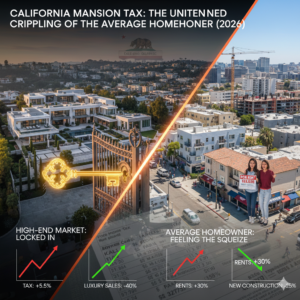 Investors in second or multiple homes stand to be among the biggest losers from the housing downturn. That’s because proposed mortgage bailout programs don’t address second homes and investment properties. Many owners of multiple properties don’t realize that investments they thought would help them build long-term wealth may in fact leave them in bankruptcy and facing a sizeable tax debt.
Investors in second or multiple homes stand to be among the biggest losers from the housing downturn. That’s because proposed mortgage bailout programs don’t address second homes and investment properties. Many owners of multiple properties don’t realize that investments they thought would help them build long-term wealth may in fact leave them in bankruptcy and facing a sizeable tax debt.
Homeowners who borrowed against the value of their second home, or who financed the purchase of their second home and subsequent homes by pledging their primary home or other properties as security, may be liable for taxes on the difference in value should they sell any of their properties for a price less than the value owed on the mortgage.
Under the Mortgage Forgiveness Debt Relief Act, a homeowner doesn’t have to pay taxes on forgiven debt if the collateral behind the mortgage is owner-occupied. That provision doesn’t apply to a growing number of homeowners renting out their second home or investment property. Of some 7.5 million vacation homes, only about 10 percent are considered owner-occupied, according to the NATIONAL ASSOCIATION of REALTORS® (NAR). Many of these homeowners borrowed against the ever-increasing (or so it seemed) value of these properties to finance improvements or to buy other properties. San Diego County real estate agents






No one put a gun to Bear Stearn’s collective head and made them spread risk ineffectively and invest in sketchy sub-prime mortgage securities. They did it all by themselves. Yet here we see a government-backed takeover to shore up confidence in a financial system that seems unable to take care of itself. Laissez-faire? Quite the opposite, it appears. What kind of message does this send to other financial institutions? Can they now expect similar access to the “discount window†that had been reserved for institutions that work with taxpayers, not investors?
San Diego Real Estate
We signed a loan for our daughter seven years ago to purcha se a condo for herself and four children. She recently moved out of state leaving us with her motgage debt. We are on a fixed income and this condo consumes 60% of our money. What can we do. It doesn’t seem to be rentable either. Is there an option (way out) for us? Otherwise we will be 95 before this is paid for.
If the condo is not rentable because of the association then there are 2 other options. The first is to sell the condo, however I am sure this would leave you upside down in the current mortgage. It is unfortunate, but it would be more affordable to pay the remaining loan balance instead of the entire amount. The other option is a stretch but if your daughters condo is in the same city as you, then you might think about moving into the condo and renting out your house… just for a little while… until the market rebounds and you can get your money back out of the condo.
The Internal Revenue Code imposes many different kinds of penalties, ranging from civil fines to imprisonment for criminal tax evasion.
If you do not file your return and pay your tax by the due date, you may have to pay a penalty. You may also have to pay a penalty if you substantially understate your tax, understate a reportable transaction, file an erroneous claim for refund or credit, or file a frivolous tax submission. If you provide fraudulent information on your return, you may have to pay a civil fraud penalty.
For foreclosure information visit California home foreclosures.